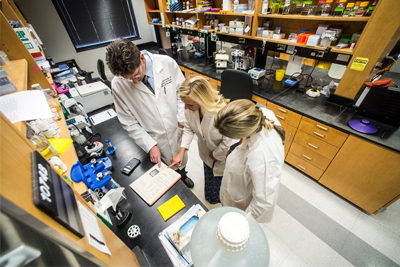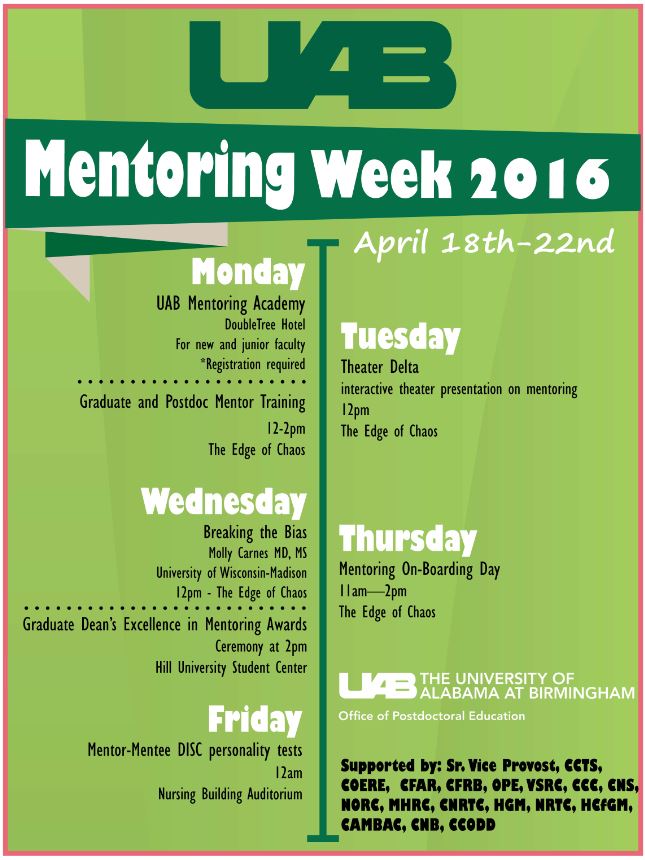I have a reoccurring memory from graduate school three years ago when I earned my doctorate in Integrated Biomedical Science. It’s Wednesday afternoon at about 3:45. My lab members are rushing to collect their things and print off last minute graphs to show our mentor. But instead of shuffling down the hall to a conference room, we pile into cars and drive to the local Irish Pub. Yes, our lab meetings were held at a pub. Yes, we had beer and fried deliciousness (fries, cheese, onion rings, pickles, if they fried it, we ate it). And yes, we actually did talk about our data and have scientific discussions at these meetings.
 Whether in the pub or in the lab, my PhD mentor took a decidedly hands-off approach, but still set aside time for a weekly meeting with each lab member. This mentor encouraged participation in poster sessions and scientific meetings to further our presentation skills and our careers. This mentor understood how to manage people and get the best out of them (and keep the drama to a minimum). Looking back, I don’t think she would say she would say she was a “natural” at good mentoring. Indeed, she regularly attended conferences and workshops to improve her mentoring.
Whether in the pub or in the lab, my PhD mentor took a decidedly hands-off approach, but still set aside time for a weekly meeting with each lab member. This mentor encouraged participation in poster sessions and scientific meetings to further our presentation skills and our careers. This mentor understood how to manage people and get the best out of them (and keep the drama to a minimum). Looking back, I don’t think she would say she would say she was a “natural” at good mentoring. Indeed, she regularly attended conferences and workshops to improve her mentoring.
I am one of the lucky ones. You know, one of those mythical graduate students who maintains a lasting relationship with a PhD mentor that extends beyond asking for recommendation letters. Today, I work as a postdoctoral fellow in Microbiology at the University of Alabama at Birmingham (UAB). And I have a confession to make. In fact, I have really not had a truly bad mentoring experience. Of course, I have heard terrifying stories from fellow grad students about their mentors. I’m sure you have heard them too. So, from my peers, I know of some mentors who could really benefit from learning how to mentor (*no names or identifying information will be provided to protect the innocent).

Like I said, I am one of the lucky ones. But wouldn’t it be wonderful – for mentees, mentors, and science – if there were a way to learn how to be a mentor? There is! That’s why UAB is holding the fourth annual Mentoring Week from April 18th-22nd. Check out these daily events (and a full list of sponsors) below.
On Monday, there is a Mentoring Academy for new and junior faculty; in another training session, graduate students and postdocs can gain mentoring skills. Theater Delta, an interactive theater for social change, will be here Tuesday to provide a provocative look at relationships. Don’t miss the chance to check your bias literacy Wednesday with the keynote talk, “Breaking the Bias,” by Dr. Molly Carnes at lunch. Be sure to stick around for the Graduate School Dean’s Excellence in Mentoring Awards when UAB’s leading mentors will be recognized by students and the larger academic community. On Thursday, Mentor-Mentee Onboarding Day will provide information about the resources available for mentors and mentees. On Friday, mentor-mentee pairs will have the opportunity to take DISC personality tests (similar to Myers-Briggs) while enjoying lunch. Note: For more information or to register for the Mentoring Academy, please email Lisa Schwiebert, Ph.D. None of the other events require registration.
Who is Mentoring Week for?
- Anyone who wants to learn how to be a better mentor.
- Anyone who wants to be a better mentee.
- Anyone who believes that by collaborating, we can do great science – together.
- Anyone who thinks it’s time for their luck to change.
See you there!
Special thanks to UAB’s Mentoring Week Sponsors: Center for Aids Research, Center for Arthritis, Musculoskeletal, Bone, and Autoimmumity Center, Center for Clinical and Translational Science, Center for Craniofacial Oral and Dental Disorders, Center for Free Radical Biology, Center for Nanomaterials and Biointegration, Center for Outcomes and Effectiveness Research and Education, Comprehensive Cancer Center, Comprehensive Diabetes Center, Comprehensive Neuroscience Center, Cystic Fibrosis Research Center, Heflin Center for Genomic Medicine, Minority Health Research Center, Nephrology Research Training Center, Nutrition and Obesity Research Center, Office of Postdoctoral Education, Senior. Vice Provost, Dr. Suzanne Austin, and Vision Science Research Center.